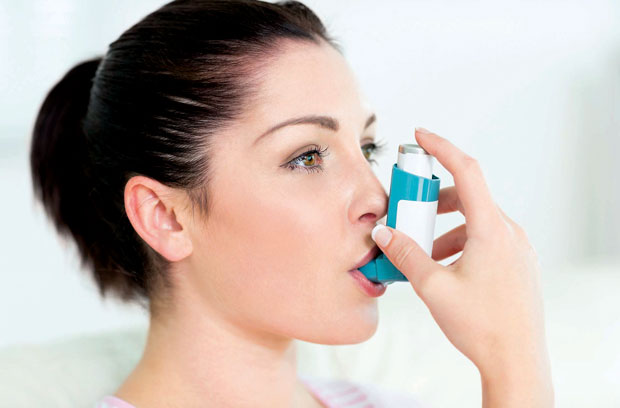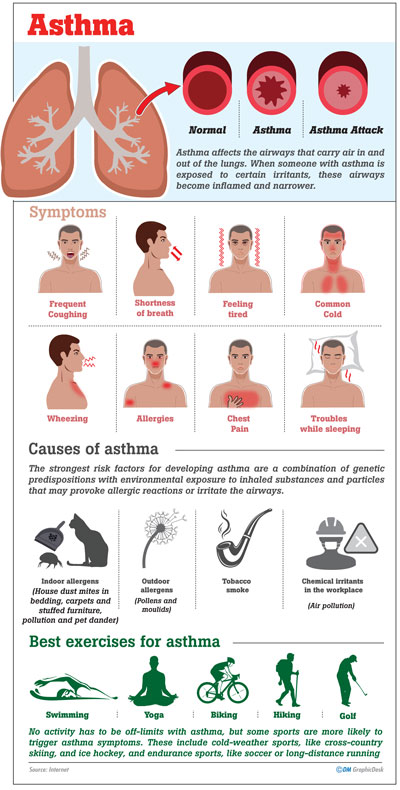05 Jan 2018 - {{hitsCtrl.values.hits}}

 Asthma is a growing problem, both in Sri Lanka and in the rest of the world. According to World Health Organization (WHO) estimates, 235 million people suffer from asthma. This condition is the most common chronic disease among children. It is not merely a public health problem in high income countries, it occurs in all countries regardless of how developed they are. Over 80% of deaths caused by asthma occur in low and lower-middle income countries. Asthma is under-diagnosed and under-treated, placing a substantial burden on individuals and families and possibly restricting individuals’ activities for the rest of his or her life.
Asthma is a growing problem, both in Sri Lanka and in the rest of the world. According to World Health Organization (WHO) estimates, 235 million people suffer from asthma. This condition is the most common chronic disease among children. It is not merely a public health problem in high income countries, it occurs in all countries regardless of how developed they are. Over 80% of deaths caused by asthma occur in low and lower-middle income countries. Asthma is under-diagnosed and under-treated, placing a substantial burden on individuals and families and possibly restricting individuals’ activities for the rest of his or her life.
Definition 
Asthma affects the airways that carry air in and out of the lungs. When someone with asthma is exposed to certain irritants, these airways become inflamed and narrower. This leads to coughing, shortness of breath, wheezing and tightness in the chest.
It is difficult to say for sure what causes asthma. You are more likely to develop it if your family has a history relating to asthma, eczema or allergies. It is likely that this, combined with certain environmental factors, are causes for someone developing asthma.
Causes
The fundamental causes of asthma are not completely understood. The strongest risk factors for developing asthma are a combination of genetic predisposition with environmental exposure to inhaled substances and particles that may provoke allergic reactions or irritate the airways, such as:
Other triggers can include cold air, extreme emotional arousal such as anger or fear and physical exercise. Even certain medications can trigger asthma. These medications are aspirin and other non-steroid anti-inflammatory drugs, and beta-blockers (which are used to treat high blood pressure, heart conditions and migraine).
Urbanization has been associated with an increase in asthma. But the exact nature of this relationship is unclear.
Management
Although asthma cannot be cured, appropriate management can control the disease and enable people to enjoy quality life.
Short-term medications are used to relieve symptoms. People with persistent symptoms must take long-term medication daily to control the underlying inflammation and prevent symptoms and exacerbations.
Medication is not the only way to control asthma. It is also important to avoid asthma triggers - stimuli that irritate and inflame the airways. With medical support, each asthma patient must learn what triggers he or she should avoid.
Although asthma does not kill on the scale of chronic obstructive pulmonary disease (COPD) or other chronic diseases, failure to use appropriate medications or to adhere to treatment can lead to death.
How can physiotherapy help?
A physio can help you learn to manage the physical effects of your asthma and something really vital; how to breathe correctly! Simple changes to the way you breathe will help you feel more relaxed, in control and will prevent your asthma symptoms from worsening.
A physio can help by showing you ways to:
Breathing exercises and asthma
How we breathe affects our health and wellness. We must breathe well to feel well. You may think that’s a no-brainer: you breathe without thinking about it, right? Not always! Many of us breathe air in and out quickly through our mouths, using our chest and neck muscles. When this becomes a habit, we feel very unwell, dizzy, anxious and breathless. This is very common if you have asthma. Physios possess the skills to help you.
Exercises are a common trigger for asthma symptoms. Many people with asthma may experience difficulty in breathing and be plagued by coughing, wheezing, or chest tightness during or after exercise. However, most people with asthma can successfully participate in their exercise of choice with proper guidance and treatment. Exercise has been shown to be beneficial to all individuals, including those with asthma.
Exercising safely
People with asthma may be more sensitive to extremes in temperature, dry air, allergens, and pollution. When resting, breathing through the nose moistens, warms, and filters the air before it enters the lungs. When exercising most people breathe through their mouths, which may trigger asthma symptoms, so people exercising with asthma may feel better breathing in through the nose and out through the mouth. People with asthma should not overexert themselves, as this may trigger asthma symptoms. Consistent exercise is generally better tolerated, but patients with asthma should stop exercising when considering certain symptoms.
Best and worst exercises
Swimming is one of the best exercises for asthma because it builds up the muscles you use for breathing. It also exposes the lungs to lots of warm, moist air, which is less likely to trigger asthma symptoms. “A comprehensive medical review of eight studies of children and adolescents from 2013 revealed that swimming increases lung function and cardiopulmonary fitness, without any serious side effects in patients with stable asthma.The ideal sport for asthmatics is swimming because you’re breathing in air that is highly humidified and often warm,” said Dr. Sujeewa Weerasinghe, National Organizer of the Chartered Society of Physiotherapist.
“And staying in that horizontal position when swimming may actually loosen mucus accumulated at the bottom of your lungs.
But be careful of pools with excessive chlorine as the chemical can trigger an asthma attack. How do you know if it’s excessive? If you can smell the chlorine, then it’s too much” he added.
Yoga is another effective exercise for asthma. A 2012 study published in the Journal of Alternative and Complementary Medicine found that yoga training over 10 weeks significantly improved quality of life scores for women with mild to moderate asthma.
Other potential physical activities for people with asthma include,
No activity has to be off-limits with asthma, but some sports are more likely to trigger asthma symptoms. These include cold-weather sports, like cross-country skiing, and ice hockey and endurance sports, like soccer or long-distance running.
Regular Exercise
Tips for exercising
It might be helpful to consult a physician as well as a physiotherapist before starting an exercise routine. This is especially important with asthma symptoms that worsen with exercise. A Physician and Physiotherapist experienced in the management of asthma can help find the best exercises and asthma medications. Many people with asthma benefit from taking a short-acting bronchodilator about 15 minutes before starting exercise. In extremely cold or hot weather, or if there is a high level of pollution, it may be best to exercise indoors. This also applies to patients with both asthma and allergies when the pollen count is high.
Here are some tips for those with asthma who wish to exercise.
Exercise is an important part of a healthy lifestyle, even for those with asthma. Aim to work out for about 30 minutes, four to five days a week. Obesity and a sedentary lifestyle may negatively impact asthma. Therefore, exercise is an important part of a healthy treatment for asthma.
Top tips
Review your symptoms and medicines with a healthcare professional at least once a year - more often if you have severe asthma.
Ensure you have an up-to-date asthma action plan in place.
Ensure you know what medicines to take, how much, how to take them and when to take them6.
Use your preventer inhaler regularly as prescribed. This will reduce your risk of having an asthma attack if you come into contact with a trigger. Be physically active as much as you can (e.g. walking, housework) and if possible exercise (e.g.an exercise programme). It is important to start slowly and only gradually increase activity as your body gets used to it.
Ensure you know who to contact if your symptoms are getting worse. Learn to breathe correctly so that you can be really active without getting wheezy.
23 Dec 2024 30 minute ago
23 Dec 2024 35 minute ago
23 Dec 2024 1 hours ago
23 Dec 2024 2 hours ago
23 Dec 2024 3 hours ago